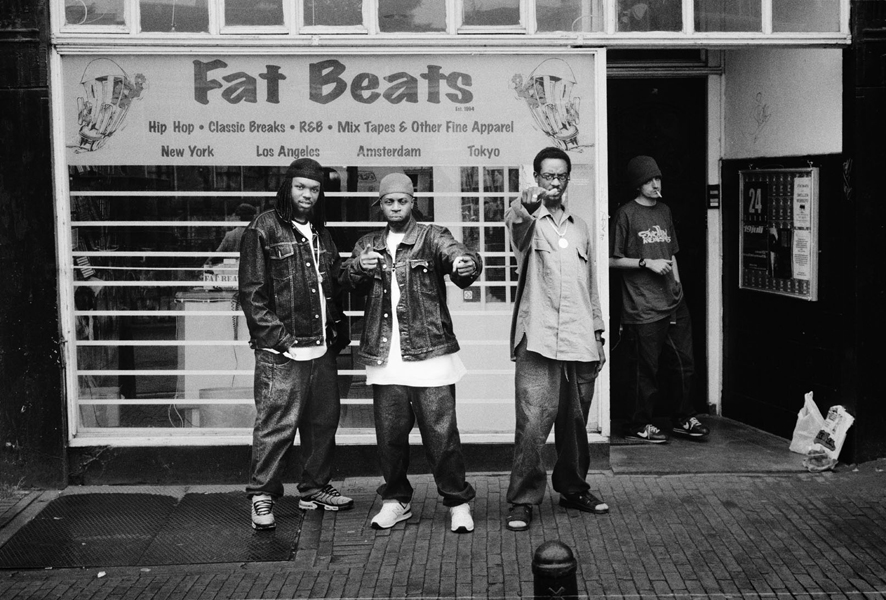Slum VIllage
Chances are, if you are anywhere near the Detroit music scene, you have heard of the influential hip hop trio that makes up Slum Village. The group was founded in the early 90′s by 3 childhood friends: Baatin, T3, rapper and producer J Dilla, who all grew up together in the Conant Gardens neighborhood of Detroit, MI. After leaving Pershing High School, the trio began to forge a path into the Detroit underground hip hop scene and quickly found themselves steadily gaining popularity, where they originally went by the name Ssenepod.
With a growing momentum now cemented in the underground, the group took on a forward trajectory toward bigger and better things, and in 1991 changed their name to Slum Village. J Dilla joined the production team known as The Ummah, which produced the two last A Tribe Called Quest studio albums, as well as hits for a number of R&B and hip hop musicians, and in 1996, they recorded their first album Vol. 1″ , recorded in Dillas basement and RJ Rice Studios, it was critically acclaimed in the Detroit underground scene. It later found its way into the hands of A Tribe Called Quest’s own Q-Tip, who played it for some of hip hop’s elite, such as Busta Rhymes, Questlove, and D’angelo. This fruitful alliance led to an opening gig for A Tribe Called Quest on their Farewell tour in 1998.
Slum Village landed their first record deal in 1998 with Barak/AM records. Due to label politics, the group was forced to release their album “Best Kept Secret” under the alias J-88,. Their now classic record, “Fantastic, Vol. 2″ was also in production, but was not officially released until 2000 through Barak/GoodVibe Records. “Fantastic Vol. 2″ was dubbed an immediate classic from fans and industry tastemakers. This album featured an A list line up including Busta Rhymes, Common, D’angelo, Jazzy Jeff, Pete Rock, Kurupt, and Q-Tip who passed the torch to Slum Village on the record “Hold Tight”. On the heels of this record release followed a tour with The Roots on the Okay Players tour/D’angelo Voodoo tour.
In 2001, while sitting down to discuss future plans, J Dilla made the decision to leave the group to pursue his solo career, citing the group was well established enough to move on without him. With J Dilla still around helping Young RJ with production, Baatin and T3 started work on their next album “Trinity” through Barak/Capital Records, featuring Elzhi on 6 of the tracks. This album would feature their first commercial single “Tainted” which ft an unknown Dwele, also disco and the remix produced by Timberland. Slum was presented with their headlining opportunity on the Family Tree tour, featuring Phife from A Tribe Called Quest.
In 2002, Dirty District, a compilation of songs by Detroit rappers largely produced by T3 and Young RJ, was released. The group then became a duo consisting of T3 and Elzhi, Baatin became sick touring shortly before the release of their 2004 album, Detroit Deli (A Taste of Detroit) and departed to seek treatment. The album included the hit single, “Selfish”, produced by Kanye West and featuring John Legend. The song samples a part of the intro to the hit song “Call Me” by Aretha Franklin. After parting ways with Capitol Records in 2005, they released Prequel to a Classic, a mixtape of mostly previously unreleased material, Slum went back into the studio to record the self-titled album Slum Village, with production from Young RJ and Black Milk. Following the album’s release, they went on tour with Shady Aftermath group, D12.
Tragedy struck in 2006 in the form of the loss of founding member J Dilla, to lupus, which put the group on a 4 year hiatus. In 2009, T3 reunited Baatin with the group, brought in Illa J (of Yancey Boys fame and J Dilla’s brother), and along with Young RJ, RJ Rice and Elzhi, started production on their next album, Villa Manifesto. Slum Village went back on the road as a trio including Baatin. Later in 2009 , Slum village performed at Rock the Bells as a trio consisting of T3 , Elzhi and Baatin, with the latter still coping with bipolar schizophrenia making him unable to travel when the tour continued into Canada that year. While T3 and Elzhi performed the Canadian shows, tragedy struck for a second time, claiming Baatin that summer at home in Detroit, his death was felt deeply throughout the Detroit Hip Hop scene.
In 2010, the album “Villa Manifesto” was released under Ne’astra/Koch Records, featuring the late Baatin. By that time Elzhi had decided to move on and focus on pursuing his own solo career. Even though the group has suffered many heartaches and member changes, Slum Village always finds a way to reinvent themselves. At present, the evolution of Slum Village continues with a reinvigorated energy, with founding member T3 holding down the legacy , and grammy nominated producer Young RJ and Illa j, the young prodigy at his side. Slum Village has a new mixtape “Dirty Slums”, presented by DJ Mick Boogie, featuring artists such as Big Sean, Rapper Big Pooh, De La Soul, Focus, Skyzoo, Phonte, and Phife,after 100,000+downloads and rave reviews, the group released an official full length album and are planning on a sequel …As the industry changes, so has Slum Village, and yet and still while some think SV may have crashed and burned, they just keep coming up like the rising phoenix.
Phat Kat
“Every time I step in the booth, I’m tryna make some classic shit,” promises Phat Kat, a pioneer of the Detroit hip-hop scene who was putting it down for the underground long before anyone ever heard of Eminem, Proof, D12, Slum Village, Natas, or Royce the 5’9.” And while rap from “the D” has come into the national limelight in recent years, few of Detroit’s current crop of MCs boast a track record or reputation as credible as Phat Kat. Back in the early ‘90s, Phat Kat helped to put the D on the hip-hop map as a member of First Down, pairing with legendary DJ/producer J Dilla (R.I.P.), then known as Jay Dee, years before Dilla’s involvement in Slum Village. After meeting Guru and Premier during a promotional stop through Detroit in 1994, Phat Kat gave them a demo tape – the first demo he had ever passed on to industry folks, he says — and First Down ended up getting signed to Payday records on the strength of one song, the now-classic “Front Street,” which appeared on the Representing the Streets compilation. First Down seemed poised to be one of the first Midwestern groups to blow up nationally; unfortunately, their label was folded into a much larger company and they were lost in transition. Undeterred, the MC also known as Ronnie Cash stayed on the grind in the ensuing years, appearing on albums by Dilla and Slum Village, hitting the road frequently, and releasing his first solo album Undeniable in 2004, followed in Spring 2007 by Carte Blanche, his first release for Look Records. At long last, Phat Kat notes, “I’m with a label that sees my vision.” Dilla contributes five tracks, but the work of up-and-coming producers Nick Speed, Young RJ, and Black Milk is nearly as impressive. Other guests include SV’s Elzhi and T3, Truth Hurts, Melanie Rutherford, Fat Ray, Loe Louis and Guilty Simpson. Rather than pursuing cameos and features from overexposed stars, Phat Kat chose instead to work with his peoples from the D, figuring “the people I got on my album is just as hot as people that’s out.” With its mix of original, streetwise rhymes that fall somewhere in-between gangsta, conscious, and backpack, grooves that can take you from the gutter to the VIP and back, and production that innovates rather than imitates, Carte Blanche is like no Detroit album you’ve ever heard before. It maintains the standard for excellence set by Phat Kat’s cohorts Dilla and Slum Village, but with a much more hardcore thrust. Asked what the album’s title means to him, Phat Kat says with a laugh, “Absolute authority. Full power,” adding, “It’s a good thing.


